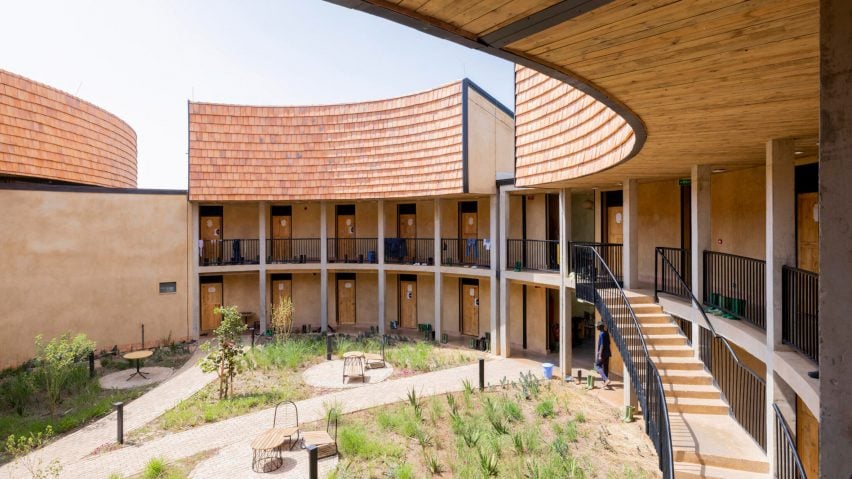A figure-eight-shaped accommodation block is among the buildings made from rammed earth and compressed earth blocks at the Rwanda Institute for Conservation Agriculture campus by US studio MASS Design Group.
Located in the village of Gashora in Rwanda, the student housing forms part of an off-grid agricultural university, where there are various education spaces including a building with a zigzagging roof.
MASS Design Group, which has an office in the Rwandan capital of Kigali, designed the Rwanda Institute for Conservation Agriculture (RICA) to be built predominantly from low-carbon local and natural materials.
It is intended to serve as a model for sustainable land use and construction, aiming to protect and restore the local ecology, and is shortlisted in the education project and sustainable building categories of the Dezeen Awards 2024.
"Through cutting-edge architecture, sustainable materials and off-grid power, RICA sets a new standard for environmental stewardship," MASS Design Group design director Chris Hardy told Dezeen.
"More than a symbol, RICA thrives as a biodiverse ecosystem, guided by a meticulous plan for native species restoration," he continued.
"From savannah woodlands to papyrus wetlands, RICA's design blends seamlessly with nature, utilising passive cooling and locally sourced materials like rammed earth and wood."
The most distinctive building on the campus is the accommodation building for second and third-year students, which is shaped like a figure eight and contains two circular courtyards.
"The shape is defined by traditional Rwandan architecture and the iconic pivot irrigation fields, while the dimensions of the two circles were arrived at by combining the ideal bedroom and furniture size, minimising the cutting of the compressed earth blocks, and the total number of students to be housed," Hardy explained.
Elsewhere, the campus centre takes the form of a semicircular building topped with a folded roof, extended to form a canopy over an outdoor space.
MASS Design Group collaborated with RICA to define five agricultural education buildings, including ones for learning about dairy, swine and poultry, row and forage crops, mechanisation and irrigation. Another building dedicated to the teaching of trees and vegetables is defined by a row of overlapping roof planes.
Each of the buildings connects to outdoor agricultural areas to aid the students' education.
Throughout the campus, walls are built from rammed earth and compressed earth blocks made from soil excavated from the site and added to a low-cement mixture, designed for earthquake resilience.
The roofs are made from locally sourced softwoods and topped with local terracotta tiles, fired with waste coffee bean husks. Stone from a local quarry was used in the foundations to reduce the amount of concrete needed.
The RICA buildings are passively ventilated and naturally lit, with internal temperatures regulated by thermal mass.
Electricity is provided by solar panels, while its water and wastewater are treated by lake pumps, filtering stations and irrigation systems.
As part of the project, MASS Design Group conserved the nearby savannah woodland and papyrus wetlands and reintroduced native species to the area, including the grey-crowned crane.
According to the studio, the institute is expected to be climate-positive by 2040, meaning it is predicted to remove more carbon dioxide equivalent from the atmosphere than it emits.
Other projects recently completed in Rwanda that have been published on Dezeen include an angular leadership centre with woven screen walls and a community sports centre made from local materials.
The photography is by Iwan Baan unless stated otherwise.

